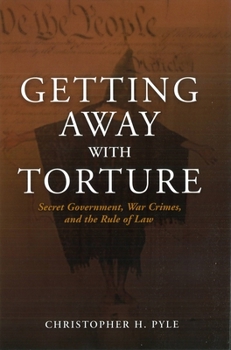Getting Away with Torture: Secret Government, War Crimes, and the Rule of Law
Select Format
Select Condition 
Book Overview
That American forces should torture prisoners in their "war" on terror is disturbing, but more shocking still is that the highest officials of the Bush-Cheney administration planned, authorized, encouraged, and concealed these war crimes. When the Supreme Court ruled that the officials were bound by the Geneva Conventions, a Republican Congress responded by granting amnesty to all responsible, from lowly interrogators to the president, while conservative judges erected a wall of secrecy to protect them even from civil liability. Meanwhile, timid Democrats have shown little stomach for repealing the amnesty law and bringing those responsible to justice. Many Americans, including those who endorsed torture to find "ticking bombs" that never were, are now embarrassed by credible reports of CIA kidnappings for purposes of torture, secret prisons into which prisoners have disappeared without a trace, and rigged tribunals to convict al Qaeda's criminals on evidence obtained by torture. But the problem is not just embarrassment; it is the widespread acceptance of unaccountable, secret government that now threatens to destroy the very foundations of constitutional government. The moral standing of the United States will not be restored, Christopher Pyle argues, until a concerted effort is made to bring our secret government under the rule of law.
Format:Hardcover
Language:English
ISBN:1597973874
ISBN13:9781597973878
Release Date:June 2009
Publisher:Potomac Books
Length:370 Pages
Weight:1.55 lbs.
Dimensions:1.3" x 6.1" x 9.0"
Customer Reviews
1 rating
Masterful!
Published by Thriftbooks.com User , 14 years ago
Mr. Pyle presents a masterful overview of the legal subterfuge perpetrated by the culture of torture. His erudition conveys how profoundly contradictory to our legal and historical heritage the policy of torture really was. The sadism that became pervasive through out this campaign of revenge was only matched by the astuteness of the perpetrators in making sure that they were able to get away with their crimes. The individuals involved in these crimes against humanity knew full well that their actions provided no positive outcome within our historical framework, yet they nevertheless continued with their agenda. The futile policy for me exhibits both the paradox of their behavior and the social pathology that infected our government officials. It is difficult reading the book at times because a state of hopelessness begins to press upon you as you come to realize that these individuals involved in the torture-matrix are going to carry out their monstrous agenda and get away with it. Mr. Pyle is a perfect example of a man who clearly demonstrates that there are still sane people in this country and good and conscientious attorneys. At the end of the book Mr. Pyle comments on how another book needs to be written on illegal surveillance. I would strongly recommend writing one if he is so inclined. He would be providing us all a great service if he did write one. For further reading on this subject I would recommend Alfred McCoy's book "A Question of Torture" which provides a further testament to just how wide spread and pervasive this culture of torture really is. In my opinion, this culture has infected many institutions in this country and many private citizens show remarkable skill in the use of the "no-touch" torture developed by the CIA.






